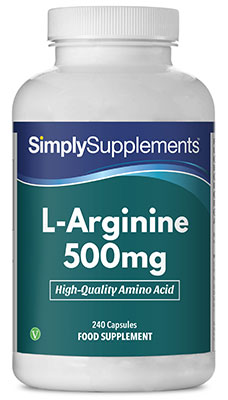L-Arginine Benefits for Men

Arginine is an amino acid that is naturally found in the body and in various food sources such as dairy, meat, fish and nuts. L-arginine, the supplement version, is most popularly used by bodybuilders but it can also offer a surprising number of other health benefits…
Sexual Function
L-arginine has been linked to improved sexual function and is commonly used for treating men with erectile dysfunction. A 1999 issue of the British Journal of Urology found that 5g per day of L-arginine for six weeks improved sexual function in men with erectile dysfunction. This is due to the fact that L-arginine increases blood flow and stimulates nitric oxide production in the body, making it easier for the soft tissue to engorge inside the penis.
A wealth of research has since been conducted into the use of L-arginine for sexual dysfunction. This even includes its benefits for arousal in women: a 2002 study looked at its effect on postmenopausal women with sexual arousal disorder. The results showed that arousal in the participants was “significantly increased” when exposed to erotic stimuli. L-arginine has now become known as a safe and legitimate supplement for increasing the sexual function of both men and women.
Heart Health
One of the most important roles that L-arginine can play in the human body is in the creation of nitric oxide, a chemical that causes blood vessels to widen. Naturally, this has beneficial effects on heart health, the widened vessels reducing blood pressure and strain on the system.
One example from the American Journal of Hypertension found that an increased intake of arginine – either in the diet or through supplementation – decreased blood pressure in participants, when compared to a control diet and regime.
Arginine’s ability to encourage blood flow also offers potential benefits for exercise. More research needs to be done in this area, but there is some promise that L-arginine may soon become part of many athletes’ standard supplement routine.
Healing and Immunity
With L-arginine increasing circulation, it means that extra blood is pumped around the body, resulting in a stronger immune system and improved healing time. Alongside this, its effects on white blood cells have also been examined, assessing whether it may help to shorten recovery times from infections.
There’s a large amount of research on this topic, with some optimistic results thus far. One study looked at both the healing and immune reactions in 36 healthy participants and stated that “[L-arginine] may be of clinical benefit in improving wound healing and immune responses.” Another observed its effect on lymphocytes - a type of white blood cell - and discovered that it was a safe stimulator of the cells.
Effects on Diabetes
Diabetes’ influence is felt across the whole body, affecting the storage of glucose and its delivery to cells. It’s been observed that this puts a strain on the circulatory system, with blood vessels struggling to relax in those with the condition. Naturally, L-arginine and its ability to relax vessels can help with this, but also it has an effect on how the body absorbs insulin; a crucial hormone in blood sugar control.
There have been positive results into the link between insulin and L-arginine; one study found that insulin sensitivity increased in participants who took L-arginine supplements for a month, compared to those who took a placebo.
Lastly it has also been noted that L-arginine can encourage cells in the pancreas, called beta cells, to more readily release insulin when stimulated by glucose.
Muscle Growth?
L-arginine supplements are popular in the bodybuilding community, where it’s seen as something that can help increase muscle mass and strength. The link is easy to make, as it’s a protein – a “building block” for muscles – that is known for supporting greater blood flow. The actual science about L-arginine building muscle, however, is less concrete.
In terms of direct strength, much of the research in L-arginine doesn’t observe an increase. One 2017 study found that there was an increase in blood flow in the muscles, aiding recovery. There are many claims that this extra blood flow helps carries nutrients to the muscles and waste away from them, assisting with growth; these properties have yet to have any substantial research conducted on their benefits.
Recommended Dosage
The recommended dosage for L-arginine is dependent on whether you are taking it as a prescribed medication by a doctor, or self-administering it as a health supplement. 5g is typically recommended for the treatment of erectile dysfunction, and doctors have experimented with 6-20g for the treatment of congestive heart failure.
For those wishing to simply get healthier, a dosage is recommended at approximately 500mg. As we can see, L-arginine can produce a wealth of benefits for both men and women and can be a fantastic supplement to include into your regular routine when combined with a healthy lifestyle.
Conclusion
L-arginine can offer a range of health benefits from sexual function to improved cardiovascular endurance. Although typically used in the area of erectile dysfunction due to L-arginine’s ability to increase blood flow, the supplement can also offer cardiovascular benefits and improve general health when combined with a healthy lifestyle.
Sources:
https://www.webmd.com/heart/arginine-heart-benefits-and-side-effects#1
https://www.healthline.com/health/erectile-dysfunction/l-arginine#speak-with-yourdoctor
https://www.jci.org/articles/view/108502
http://science.sciencemag.org/content/255/5045/721
http://care.diabetesjournals.org/content/24/5/875
https://www.sciencedaily.com/releases/2008/01/080131161759.htm
https://academic.oup.com/jn/article/137/6/1681S/4664953
https://europepmc.org/abstract/med/7020137
https://europepmc.org/abstract/med/2382229
https://onlinelibrary.wiley.com/doi/abs/10.1177/011542650502000152
https://link.springer.com/article/10.1023/A:1016220225392
https://academic.oup.com/ajh/article/13/5/547/103075
https://journals.lww.com/co-clinicalnutrition/Abstract/2007/01000/Effects_of_L_arginine_supplementation_on_exercise.9.aspx
https://www.ncbi.nlm.nih.gov/pubmed/22251130

 Nicole
Nicole 

























